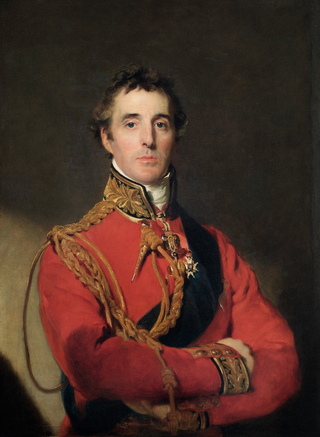
Arthur Wellesley, 1st Duke of Wellington, was an Anglo-Irish statesman, soldier, and British Tory politician who was one of the leading military and political figures of 19th-century Britain, serving twice as prime minister of the United Kingdom. He is among the commanders who won and ended the Napoleonic Wars when the Seventh Coalition defeated Napoleon at the Battle of Waterloo in 1815.

Elizabeth Patterson Bonaparte was an American socialite. She was the daughter of a Baltimore merchant and the first wife of Jérôme Bonaparte, Napoleon's youngest brother.

Joseph-Napoléon Bonaparte was a French statesman, lawyer, diplomat and older brother of Napoleon Bonaparte. During the Napoleonic Wars, the latter made him King of Naples (1806–1808), and then King of Spain (1808–1813). After the fall of Napoleon, Joseph styled himself Comte de Survilliers and emigrated to the United States, where he settled near Bordentown, New Jersey, on an estate overlooking the Delaware River not far from Philadelphia.

Napoleon Bonaparte, later known by his regnal name Napoleon I, was a French military commander and political leader who rose to prominence during the French Revolution and led successful campaigns during the Revolutionary Wars. He was the leader of the French Republic as First Consul from 1799 to 1804, then of the French Empire as Emperor of the French from 1804 until 1814, and briefly again in 1815. Napoleon's political and cultural legacy endures as a celebrated and controversial leader. He initiated many liberal reforms that have persisted through the years, and is considered one of the greatest military commanders in history. His campaigns are still studied at military academies worldwide. Between three and six million soldiers and civilians died in the Napoleonic Wars.

Duke of Wellington is a title in the Peerage of the United Kingdom. The name derived from Wellington in Somerset. The title was created in 1814 for Arthur Wellesley, 1st Marquess of Wellington, the Anglo-Irish military commander who is best known for leading the decisive victory with Field Marshal von Blücher over Napoleon's forces at Waterloo in Brabant. Wellesley later served twice as British prime minister.

Filippo Antonio Pasquale de' Paoli was a Corsican patriot, statesman, and military leader who was at the forefront of resistance movements against the Genoese and later French rule over the island. He became the President of the Executive Council of the General Diet of the People of Corsica and wrote the Constitution of the state.
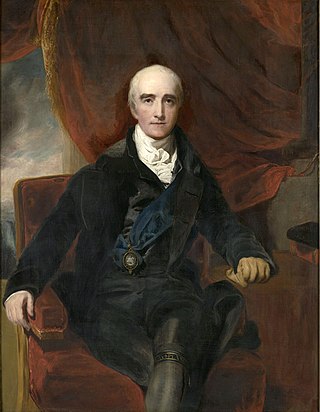
Richard Colley Wellesley, 1st Marquess Wellesley, was an Anglo-Irish politician and colonial administrator. He was styled as Viscount Wellesley until 1781, when he succeeded his father as 2nd Earl of Mornington. In 1799, he was granted the Irish peerage title of Marquess Wellesley. He was also Lord Wellesley in the Peerage of Great Britain.
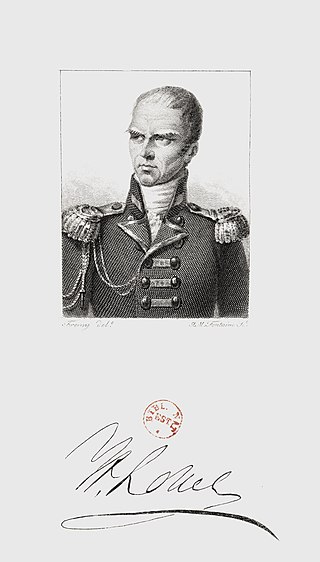
Sir Hudson Lowe was an Anglo-Irish soldier and colonial administrator who is best known for his time as Governor of St Helena, where he was the "gaoler" of the Emperor Napoleon.
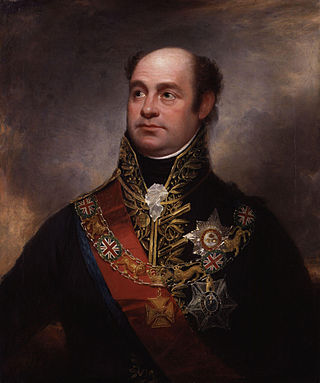
General William Carr Beresford, 1st Viscount Beresford, 1st Marquis of Campo Maior, was an Anglo-Irish soldier and politician. A general in the British Army and a Marshal in the Portuguese Army, he fought alongside the Duke of Wellington in the Peninsular War and held the office of Master-General of the Ordnance in 1828 in the First Wellington ministry. He led the 1806 failed British invasion of Buenos Aires.

Carlo Maria Buonaparte or Charles-Marie Bonaparte was a Corsican lawyer and diplomat, best known as the father of Napoleon Bonaparte and grandfather of Napoleon III.
In history and heraldry, a cadet branch consists of the male-line descendants of a monarch's or patriarch's younger sons (cadets). In the ruling dynasties and noble families of much of Europe and Asia, the family's major assets have historically been passed from a father to his firstborn son in what is known as primogeniture; younger sons, the cadets, inherited less wealth and authority to pass to future generations of descendants.
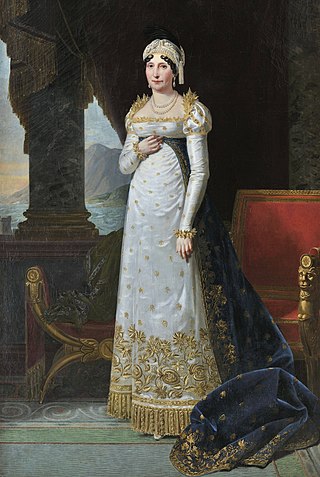
Maria-Letizia Bonaparte, known as Letizia Bonaparte, was a Corsican noblewoman and the mother of Napoleon I of France. As the mother of the Emperor, she received the title of "Madame Mère".
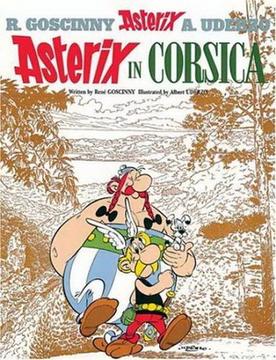
Asterix in Corsica is the twentieth volume of the Asterix comic book series, by René Goscinny (stories) and Albert Uderzo (artwork). It was originally serialized in Pilote issues 687–708 in 1973. It is the best-selling title in the history of the series, owing to its sales in the French market, but is one of the least-selling titles in the English language.

The Generals is the second volume in Simon Scarrow's Wellington and Napoleon Quartet, which narrates mostly in alternate chapters, tells the story of Sir Arthur Wellesley and the Corsican Brigadier Napoleon Bonaparte.

General Sir Brent Spencer was an Anglo-Irish officer in the British Army, seeing active service during the American Revolutionary War and the French Revolutionary Wars. During the Peninsular War he became General Wellesley's second-in-command on two occasions. He fought at Vimeiro and testified in Wellesley's favour at the inquiry following the Convention of Cintra. He led a division at Bussaco and two divisions at Fuentes de Onoro. After the latter action, he had an independent command in northern Portugal. Wellesley, now Lord Wellington, was not satisfied that Spencer was up to the responsibilities of second-in-command and he was replaced by Thomas Graham. Miffed, Spencer left Portugal and never returned. He became a full general in 1825.

The British Army during the Napoleonic Wars experienced a time of rapid change. At the beginning of the French Revolutionary Wars in 1793, the army was a small, awkwardly administered force of barely 40,000 men. By the end of the period, the numbers had vastly increased. At its peak, in 1813, the regular army contained over 250,000 men. The British infantry was "the only military force not to suffer a major reverse at the hands of Napoleonic France."
An Irish Indian is an Indian citizen who is fully or partially of Irish descent, who is aware of such ancestry and remains connected, to some degree, to Irish culture and also can be an Irish-born person who is of Indian origin. As per article 366(2) of the Indian Constitution, an Irish Indian can be categorized as an Anglo-Indian.

The French conquest of Corsica was a successful expedition by French forces of the Kingdom of France under Comte de Vaux, against Corsican forces under Pasquale Paoli of the Corsican Republic. The expedition was launched in May 1768, in the aftermath of the Seven Years' War. A French expeditionary force was landed on the island of Corsica, then ruled by the Corsican Republic. Marching inland to overcome any Corsican opposition, the French force initially suffered an unexpected defeat at the Battle of Borgo. But a new commander, the Comte de Vaux, was appointed to lead the expedition, and decisively defeated the Corsican army at the Battle of Ponte Novu in 1769, effectively bringing an end to Corsican resistance.

Arthur Wellesley, 1st Duke of Wellington,, was one of the leading British military and political figures of the 19th century. Often referred to solely as "The Duke of Wellington", he led a successful military career in the Indian subcontinent during the Fourth Anglo-Mysore War (1798–99) and the Second Anglo-Maratha War (1803–1805), and in Europe during the Napoleonic Wars (1803–1815).

The French expedition to Sardinia was a short military campaign fought in 1793 in the Mediterranean Sea in the first year of the War of the First Coalition, during the French Revolutionary Wars. The operation was the first offensive by the new French Republic in the Mediterranean during the conflict, and was directed at the island of Sardinia, part of the Kingdom of Sardinia. Sardinia was neutral at the time, but immediately joined the anti-French coalition. The operation was a failure, with attacks directed at Cagliari in the south and La Maddalena in the north both ending in defeat.

















